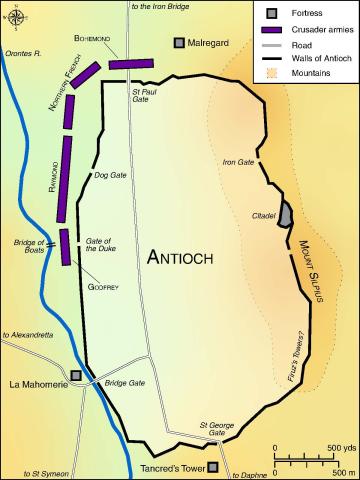The Crusaders Besiege Antioch
[6.14.2] Ēgrediēbātur tunc vir prūdēns Boamundus cum suō exercitū dē terrā Saracēnōrum, vēnitque in Tancredi montānam, cōgitāns an forte ibi valēret invenīre aliquid quod potuisset dēferrī. Nam tōtam terram in expendīō mīserant; aliī quippe invēnerant, aliī vērō vacuī redierant. Tunc vir sapiēns Boamundus increpāvit eōs dīcēns: “Ō īnfēlīx et miserrima gēns, Ō vīlissima omnium Chrīstiānōrum, cūr tam celeriter vultis abīre? Sinite, modo sinite, ūsquequō erimus congregātī in ūnum, et nōlīte errāre sīcut ovēs nōn habentēs pāstōrem. Sī autem inimīcī nostrī invēnerint vōs errantēs, occīdent vōs, quia diē noctūque vigilant, ut vōs sine ductōre sēgregātōs sīve sōlōs inveniant; vōsque cotīdiē occīdere et in captīvitātem dūcere labōrant.” Cumque fīnis esset dictīs, rediit ad suam hostem, cum suīs plūs vacuīs quam onustīs.
[6.14.3] Videntēs autem Armēniī et Syrānī quod nostrī penitus vacuī rediissent, cōnsiliātī in ūnum abībant per montāneās et praescīta loca, subtīliter inquīrentēs et ementēs frūmentum et corporea alimenta, quae ad hostem dēferēbant, in quā erat famēs immēnsa; et vēndēbant onus ūnīus asinī octo purpurātīs, quī appretiābantur centum vīgintī solidīs dēnāriōrum. Ibi quidem sunt mortuī multī ex nostrīs, nōn habentēs pretium unde tam cārum emere potuissent.
notes
vocabulary
6.14.2
dēferō dēferre dētulī dēlātum: to carry off (as plunder)
expendium –iī, n.: expense, outlay (ML)
sinō sinere sīvī situm: "leave (something) alone" (OLD 1)
ūsquequō: until (ML).
6.14.3
penitus: completely
montanea –ae, f.: mountain (ML = mons montis, m. )
subtīliter: carefully
appretiō (1): to value, estimate the price of (LL)
cārus –a –um: costly

